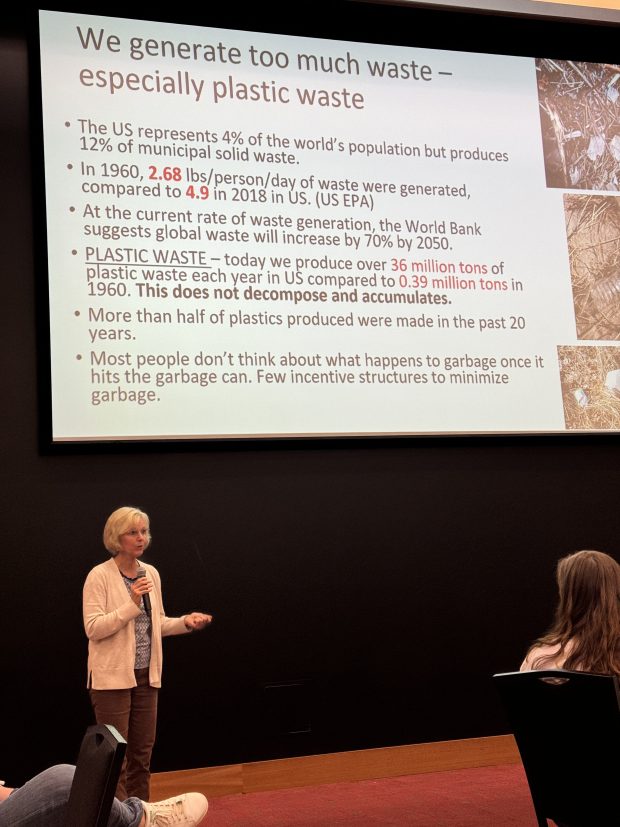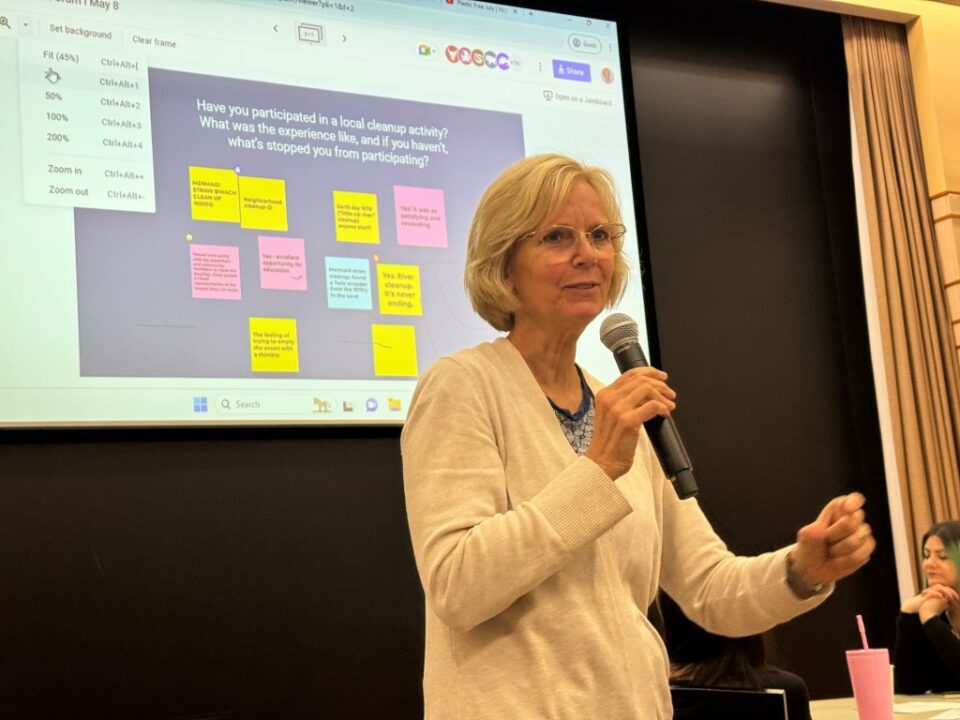A new group has been formed to address the growing problem of pollution from plastics.
Valparaiso University chemistry professor Julie Peller put the issue in perspective at a recent forum.
“This is a really scary statistic, that half of all plastic ever produced has been made in the last 20 years,” she said on Wednesday, May 8.
“There was a time around 1960 where we generated about 2.5 pounds of waste per person per day, and that’s just about doubled. If we continue on this trajectory of producing more and more waste, things are going to get pretty ugly,” Peller said.
“We all know that plastic doesn’t decompose,” so this will be a problem for generations to come, she said.
Compounding the problem is the fiscal reality of how Americans view waste disposal. “We all pay the same amount to get rid of our garbage so there there’s just really no incentive financially to change what we’re doing,” she said.
Peller cited numerous adverse health effects from the presence of nanoplastics and microplastics – basically the same thing except the size of the particles differs.
Microplastics are everywhere.
Peller said making sure the water she uses in the laboratory doesn’t have plastic molecules is difficult.
“We literally just took a drop and used the microscope type of slide and let it dry on the slide and then we viewed it with our microscope. We couldn’t get a drop of water that wasn’t full of nanoplastics already,” she said.
“We couldn’t even do our blank from our lab water that was free of plastics, and this is supposed to be the highest purity water that’s out there,” Peller said.
Now there’s a water deionizer to get all the ions out of the water. The water passes through plastic filters that pick up some of the nanoplastics.
“We literally have a setup in our lab now where we boil water and then we condense it in the hopes of leaving all that plastic behind. I have a glass condensing tube that now has a white film around it from all that plastic,” Peller said.

Adam Harrington, cofounder of Mermaid Straw, has been concerned about this issue for years. “We have been working with Julie for the past four to five years coming up with solutions,” he said.
One solution is to refuse to use single-use plastic straws provided by restaurants and instead choose reusable straws like the ones his company sells, he said.
Mermaid Straw also hosts cleanups on the beach and in communities to pick up litter.
“We need more people on board with this,” Harrington said. “We want to build this community of people that want to actually not just talk about it but actually take action.”
“We need to address the fundamental source of the problem,” a retired VU faculty member at the forum said. “You go to Costco, and they’re carrying these bags full of these individual water bottles, 24 in a case, and it looks like they don’t have any water at home.”
Another attendee told of picking up waste during breaks while building an addition to a school in Nicaragua. “You’d be surprised at how many people actually watch and see what you’re doing,” he said.
During recess, the students acted on their own to follow suit. “It’s amazing how just being an example can spread that,” he said.
Walt Breitinger took VU to task for using throwaway plastic utensils in the cafeteria. “It’s time for the students to start to scream and holler and really make a point with the administration,” he said. “You are the customers here. You are the ones paying the bills, or your parents.”
In Porter County, the only plastics that can be recycled are bottles, tubs (like cottage cheese comes in) and jugs, said Keri Marrs Barron, director at Porter County Recycling & Waste Reduction. “We don’t want clamshells.”
Peller said individuals can ask stores to package things differently so less plastic is used.
“Our first step was bringing the community together,” Valparaiso City Council member Ellen Kapitan, D-At-large, said. “It’s going to take a lot of us to influence change.”
Doug Ross is a freelance reporter for the Post-Tribune.
Doug Ross , 2024-05-19 17:06:14
Source link


